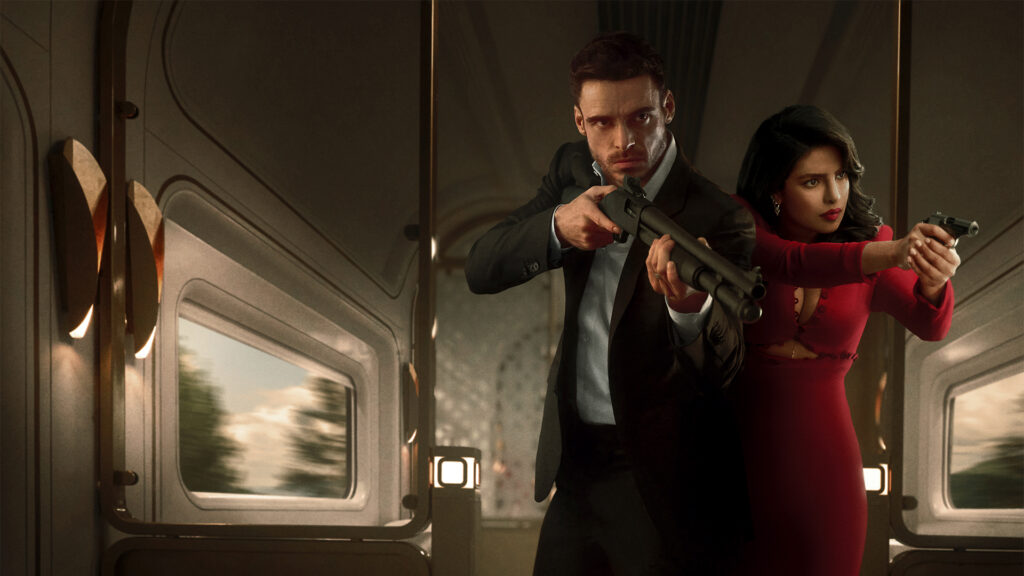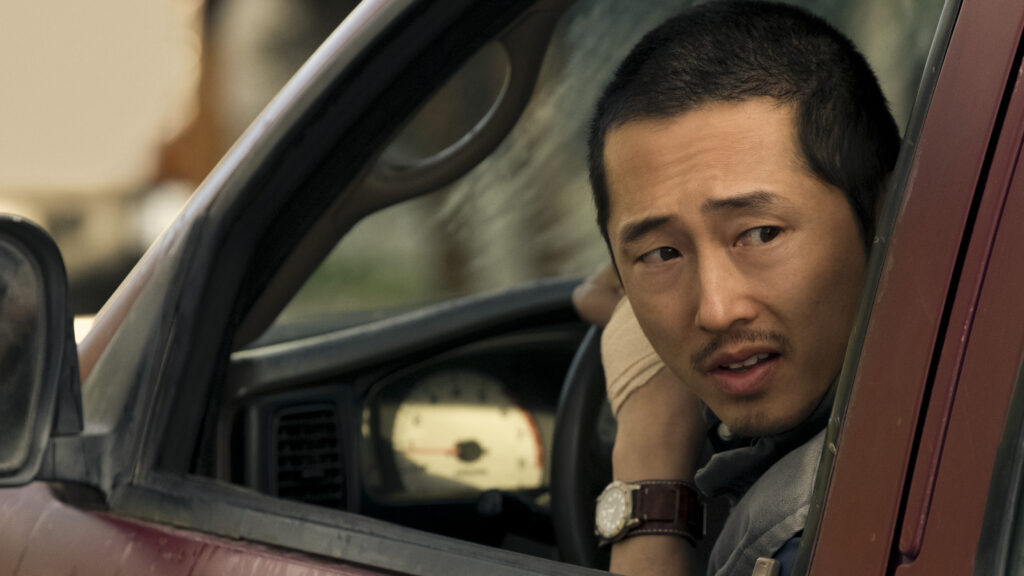
Did we get duped?
All along, were the Russos, actually, bad filmmakers?
This is a bold, maybe even triggering, accusation.
But the question needs to be asked because I watched Citadel this weekend, the gigantically budgeted new Amazon show that uses the words “highly enriched uranium” in its very first scene — WHAT YEAR IS THIS? 1984??? — and it was created by the Russo brothers.
The show’s 51% Rotten Tomatoes score clearly isn’t accurate as the show can’t be measured in ripe and rotten tomatoes. It must be measured in those mass produced faded tomatoes you find at the big brand supermarkets, the ones so devoid of taste, you wonder if they can even legally be called tomatoes. If we’re measuring this show by those tomatoes, it gets 100%. Because it is 100% bland.
Since their Marvel experience, the Russos gave us their gritty miscast character piece, Cherry, which I hear did quite well at the cast and crew screening, the only people who actually saw the movie. They then gave us The Gray Man, possibly the most generic piece of action filmmaking the universe has been subjected to. And now this. This…. Whatever Citadel is. If nobody had told me, I might assume it was a very long commercial for a new fragrance.
The Russos have long been an anomaly. They were comedy directors, giving us the Owen Wilson film, “You, Me, and Dupree.” They then became TV show directors, helming episodes of Arrested Development, Happy Endings, and Community.
People thought Kevin Feige had lost his marbles when he gave the Russos a Marvel film (Captain America: Winter Soldier). But they delivered. That got them Captain America: Civil War and then the Avengers films, which turned them into household names.
But are the Russos merely beneficiaries of the Marvel formula at a time when it was at its most potent? Or are they actually exceptional?
Hollywood is a strange place that has the power to make people and things look bigger and better than they actually are. It’s a spin zone, the most formidable of all time. They can spin you up or, when they no longer need you, spit you out. It’s that spitting part that exposes you – that leaves you naked and bare. Those who were actually good survive this spitting. Those who don’t churn out an endless stream of tomato compost.
I watched this Jennifer Lawrence trailer for her latest movie, No Hard Feelings. The film, about an older woman who gets paid by a couple of parents to help their son lose his virginity before he goes to college, is the result of Lawrence “taking control of her career” and making her own choices, as opposed to doing her agents’ bidding. It literally looks like the worst film of all time.
I see that streak Lawrence was on with Hunger Games, Silver Linings Playbook, and American Hustle, and she just looked invincible. When you saw her getting nominated for Oscars, you didn’t bat an eye. It made sense because the Hollywood machine told you it made sense. This was one of the greatest actresses of our generation, they said, and we nodded like zombies who’d been promised fresh brains for dinner.
Since then, she’s made Red Sparrow, Serena, X-Men Apocalypse, Joy, Passengers, Mother, Dark Phoenix, Don’t Look Up, and Causeway – a stretch of extremely mediocre films. So which one is the real Jennifer Lawrence? Is it the one who went on that first streak or this one?
There’s an argument to be made that it’s so hard to make anything good in this town that if you can make even ONE great film, you’ve done the impossible. And if you can make three great films? You’ve done something 99.99999999% of people who come to Los Angeles never achieved. That cannot be a fluke. So why not celebrate that instead of focusing on all the duds they made?
Fair. But when you make five bad movies in a row (or six, or seven, or eight), it’s hard not to question whether you were as good as everyone said you were. Maybe the powers that be knew how to protect your weaknesses as an actor, or, in the Russos’ case, as directors.

If you’re looking to watch something actually good, I suggest staying away from Amazon’s solipsismistic snafu, and starting up Beef, on Netflix. I know some people have had a problem with this series because Amy Lau (Ali Wong) is the single most unlikable person on the planet. But if you push past the first couple of episodes, she becomes more tolerable.
The series is about a down-on-his-luck landscaper, Danny, who gets in a road rage incident with the CEO of a Goop-like wellness company, Amy. Danny chases her down, finds out her name, and starts stalking her. She retaliates in kind. And the two go back and forth at each other, the stakes escalating each time, until they’re at life-destroying levels.
There are a couple of great screenwriting lessons the series teaches us, the most obvious being the power of conflict. This entire series is built around a strong case of conflict. But conflict all on its own can’t carry a story. And it definitely can’t carry 10 episodes of television. You need something more.
So the second thing we’ve got is CLASS. These aren’t two rich people going at it. It’s not two poor people battling. It’s one rich person and one poor person. This turbo-charges the conflict because now we’ve got a class war. Also, in that initial interaction, Amy “wins” the road rage duel. Which creates an underdog scenario. Because, now, we want Danny to get her back. That’s why we’re going to tune in to the next episode. And the episode after that.
Then, like any good TV show, it starts giving you insight into these peoples’ lives, particularly Amy’s life, which, we find out, is a difficult one. She’s the breadwinner in her family. Her impotent husband is a lousy artist living off his much more famous father’s talent. So all the pressure is on her to make the money.
The screenwriters wisely create this storyline in which Amy is trying to sell her company to a bigger company, which places a ticking clock on the timeline and also places something at stake. If Danny were to do something that ruins this sale, Amy’s entire life would fall apart. Which means that all their interactions have weight. There are consequences involved.
The mistake a lot of amateur writers make is that there are never any real consequences to anything the characters do. You need to create situations where a conversation actually has implications on the characters’ lives.
The show still exhibits issues that Streaming TV hasn’t solved yet. Which is that if you’re a straight serialized show, your series inevitably falls into a rut. As a reminder, a serialized show has one continuous storyline, like Breaking Bad. A procedural show, like CSI, is a series of self-contained stories with little continuity or overarching plot.
It’s much harder to create episode ideas in a serialized show because, unlike Grey’s Anatomy, you can’t just throw in a new “sick person of the week.” You have to create brand new plot and, inevitably, these shows don’t have enough plot to fill up all that space. This forces them to start going backwards, via flashbacks, disrupting the forward momentum of the story. Which is exactly what happens in Beef, a show that is at its apex SPECIFICALLY when it has momentum.
The writers will always defend these choices as “getting to know the characters better,” and that’s true. We do learn more about the characters if we go into their pasts. But good writers are supposed to be able to do this WHILE KEEPING THE STORY MOVING. Any schmo off the street can write a flashback scene to some traumatic event that happened when their character was five. Real screenwriters are supposed to be able to come up with creative ways to get those details across within the flow of the story.
With that said, faults and all, I really liked this series. Beyond what I talked about, it does a great job expanding all of the characters’ lives. Characters who you think are going to be unimportant turn out to have these fully fleshed out complex storylines. I loved Danny’s lughead brother and Amy’s talentless stay-at-home husband. And the series isn’t afraid to get weird. It’s the polar opposite of Citadel. And gosh darnit, thank god for that.

